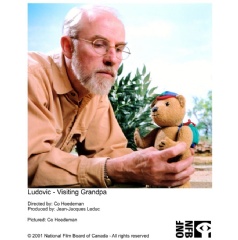Celebrating the Life and Legacy of Co Hoedeman: A Pioneering Force in Animation
Montreal – WEBWIRE –
Honoring a Visionary Animator and Filmmaker
The National Film Board of Canada (NFB) is deeply saddened to announce the passing of Co Hoedeman, a renowned animator and director whose innovative work left an indelible mark on the world of animation. Hoedeman, who passed away in Montreal at the age of 84, was celebrated for his groundbreaking techniques and heartfelt storytelling that resonated across generations.
Early Life and Artistic Foundations
Born in Amsterdam on August 1, 1940, Co Hoedeman’s journey into the world of animation was marked by a relentless pursuit of artistic excellence. His mastery of stop-motion and puppet animation earned him international acclaim, notably with his 1977 masterpiece The Sand Castle, which secured the Academy Award for Best Animated Short Film. His career was characterized by a commitment to pushing creative boundaries and exploring meaningful themes through visual storytelling.
Innovative Contributions and Humanitarian Focus
Throughout his extensive career at the NFB, Hoedeman distinguished himself not only through technical innovation but also through his dedication to social issues. His films often addressed themes of environmental conservation, cultural identity, and the well-being of children. His passion for public filmmaking and his advocacy for the importance of accessible, community-oriented cinema made him a beloved figure within the Canadian animation community and beyond.
Notable Works and Artistic Evolution
Following his early successes, Hoedeman traveled to Czechoslovakia in 1970 to study puppet animation techniques, which he then integrated into his own projects. His 1972 film Tchou-tchou, crafted with wooden blocks, earned the British Academy of Film and Television Arts (BAFTA) Award for Best Animated Film. During the 1970s, he produced a series of acclaimed films inspired by Inuit oral traditions, collaborating closely with artists from Nunavut and Nunavik to authentically portray indigenous stories and perspectives.
Continued Innovation and Social Engagement
After winning the Oscar for The Sand Castle, Hoedeman continued to experiment with diverse animation techniques and thematic content. In 1992, he collaborated with Indigenous inmates at La Macaza Prison to create The Sniffing Agreement, a cautionary tale about substance abuse. His dedication to storytelling for children was exemplified by the beloved series Ludovic’s Four Seasons, featuring a young teddy bear navigating the world through the seasons.
Later Years and Lasting Impact
In 2004, Hoedeman completed Marianne’s Theatre, his final film with the NFB, before embarking on a prolific independent animation career. His work often reflected personal history, such as the deeply introspective 55 Socks (2011), which drew inspiration from the Dutch Winter Hunger of 1944-45. He also adapted his Ludovic character into a popular children’s television series, extending his influence to new generations.
Recognition and Legacy
In 2003, the Cinémathèque québécoise and the NFB honored Hoedeman with an exhibition titled Exposition Co Hoedeman: Les Jardins de l’enfance. The following year, this tribute traveled to France’s Château d’Annecy, highlighting his significance in both Canadian and international animation circles. In 2013, Hoedeman was featured in the NFB’s online anthology Making Movie History and was the subject of the documentary Co Hoedeman, Animator.
Preserving a Cultural Heritage
Today, all of Hoedeman’s films are freely accessible on the NFB’s website, ensuring that his innovative spirit continues to inspire. His work exemplifies the power of animation to tell compelling stories that foster understanding and empathy across cultures and generations.
The NFB’s Role in Canadian Cultural Identity
For over eight decades, the National Film Board of Canada has been a cornerstone of the country’s cultural landscape, dedicated to producing, distributing, and preserving a vast collection of audiovisual works. These films serve as a vital record of Canadian history, identity, and diversity. The NFB collaborates with filmmakers from all regions and backgrounds, nurturing creativity and pioneering new storytelling techniques that resonate with diverse audiences.
Annually, the NFB adds approximately 50 new films-many of which are innovative documentaries and animated shorts-to its extensive catalog of over 14,000 titles, with half available for free streaming at nfb.ca. Through its ongoing efforts, the NFB continues to shape Canada’s cultural narrative and foster a vibrant, inclusive future for storytelling.
Image Source: WebWire
WebWireID339004
This press release content was prepared by the WebWire editorial team. Linking and sharing are encouraged. Distribution services are provided by WebWire.

